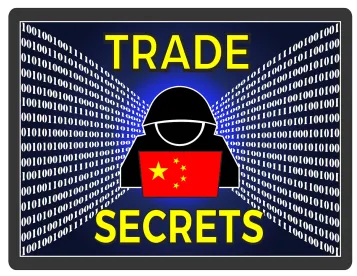Background
On January 5, 2023, President Biden signed into law S. 1294, the “Protecting American Intellectual Property Act of 2022”. The Act requires the president to report to Congress and impose sanctions on any foreign person or entity the president identifies that has committed or “provided significant financial, material, or technological support” for the significant theft of trade secrets that are “reasonably likely to result in or has materially contributed to a significant threat to the national security, foreign policy, or economic health or financial stability of the United States.”
If there is a presidential finding of a trade secret theft, the Act mandates the imposition of five of the sanctions from among the menu of potential sanctions listed below, including the following:
-
Blocking and prohibiting all transactions involving property and interests in property subject to U.S. jurisdiction
-
Including the entity or person on the Entity List
-
Prohibiting the Export-Import bank from being involved in the financing of any export of goods or services for the entity
-
Prohibiting U.S. financial institutions from loaning more than $10,000,000 to the entity in any given year
-
Directing U.S. executive directors at international financial institutions to oppose loans to the entity
-
Prohibiting the entity from continuing or becoming a primary dealer in U.S. government debt instruments
-
Prohibiting the entity from being a repository of U.S. government funds
-
Prohibiting the U.S. government from procuring any goods or services from the entity
-
Prohibiting any transactions in foreign exchanges subject to the jurisdiction of the U.S.
-
Prohibiting any transfers of credit or payments between financial institutions subject to the jurisdiction of the U.S.
-
Prohibiting U.S. persons from investing in or purchasing significant amounts of equity or debt instruments of the entity
-
Denying visas to any aliens that is a corporate officer or principal of, or a controlling shareholder of the entity
-
Imposing any of the above sanctions on executive officers or similar personnel of the entity
The first option, which blocks and prohibits all transactions subject to U.S. jurisdiction, would substantially harm a company’s U.S. operation. The second option, which places any identified company on the Entity List, would have a significant effect outside the United States, and effectively prevent a company from acquiring any U.S.-origin commodities or technologies. While the Act mandates the imposition of five sanctions upon a presidential finding of an alleged trade secret theft, the president will have the discretion to choose which sanctions to impose.
If an individual is identified, the president must block and prohibit all of the individual’s transactions involving property and property interests subject to U.S. jurisdiction. The individual will also be inadmissible to the United States and ineligible for a visa or immigration parole.
Threshold for the Significant Theft of a Trade Secret
From the outset, we note that the evidential threshold for the imposition of sanctions seems to be low, as the president merely needs to submit to the appropriate congressional committees “a report” “describing the nature, objective, and outcome of the theft of trade secrets”. There is no explicit requirement for submitting evidence.
We further note that the legal threshold for the imposition of sanctions seems to be vague. That vagueness may be intentional, creating a concern in the industry such that no party will want to get too close to a line that is not well defined because even being near that line creates a risk of a violation. Congress also appears to be giving the executive branch room to operate and maneuver on what it may determine to be a significant trade theft.
The Act does not define what constitutes “significant financial, material, or technological support”; what trade secrets may “materially contribute” to a threat or is “significant”; or any other specific sectors within the “national security, foreign policy or economic health” of the U.S.
The Act’s vagueness stands in contrast to two previous bills where we have also seen the use of menu-based sanctions: the Countering America’s Adversaries Through Sanctions Act (CAATSA) and the Comprehensive Iran Sanctions, Accountability, and Divestment Act of 2010 (CISADA). In those bills, the trigger to impose sanctions were more clear and quantifiable, than what is presented in this Act. Congress could have given a brighter line as to what would trigger a sanction as seen in CISADA and CAATSA but did not do so.
This Act codifies the U.S. government’s ability to impose sanctions based on trade secrets issues. In 2018, the Trump Administration imposed sanctions on a Chinese semiconductor company, Fujian Jinhua, amid allegations of trade secrets theft. At the risk of speculating, we view it as likely that the U.S. government may focus on critical technologies on which the United States competes with China, such as semiconductors and artificial intelligence.
Key Takeaways
Initial Prevention is Critical: The Act only requires a presidential determination before sanctions could potentially be imposed. Due to the length of time it takes to resolve trade secret theft disputes in court, a positive judicial finding will likely not stop sanctions from being imposed once a determination is made. Thus, it will be critical for companies to stave off sanctions right from the outset. This will usually require robust lines of communication between the company, its counsel, and the Office of Foreign Assets Control (OFAC) or the Bureau of Industry and Security (BIS).
Preparing for any Potential Sanctions: Typically, companies facing sanctions should first expect a warning letter from the regulators, notifying the company that a determination has been made or will be made. If OFAC is considering imposing sanctions, there may be an opportunity to provide further information or correct or amend the prohibited.
If BIS is considering putting a company on the Unverified List, there will normally be an opportunity for companies to allow BIS to verify their information before the Unverified list designation becomes an Entity List designation. Companies will have an opportunity to respond to the U.S. government findings, but they will need to act quickly and decisively to forestall a designation.
What Can Companies Do?: First, companies should take any allegations of trade secret issues seriously, and promptly address them. In particular, if a company receives a letter alleging trade secret violations, it should do more than ask the alleging party to provide evidence. Rather, the targeted company should make efforts to understand and resolve the issues early on, including conducting an internal investigation. Second, companies should keep clear and contemporaneous records of the development of their technologies and be able to demonstrate its sourcing. Lastly, companies should consider obtaining legal opinions that their critical technologies and products are independently developed without using any alleged trade secrets.







 />i
/>i
